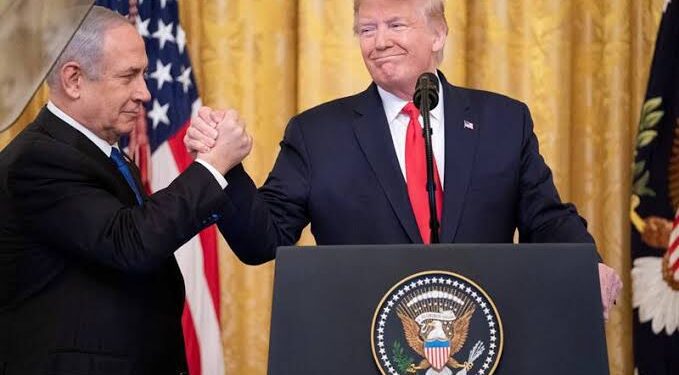Donald Trump’s potential return to the White House has sparked debate over its impact on Palestine. The pro-Israel policies of trump and unpredictable leadership style leave Palestinians and their allies questioning his future approach. While his past presidency was marked by unwavering support for Israel, subtle differences in his approach compared to Biden’s suggest possible nuances in policy.
Trump’s Record on Palestine
Trump’s first term from 2016 to 2020 introduced unprecedented policies favoring Israel. He recognized Israel’s annexation of the Syrian Golan Heights and moved the U.S. Embassy to Jerusalem. His administration halted funding to the UNRWA and cut $200 million in aid to the Palestinian Authority. He brokered normalization agreements between Israel and Arab states like the UAE, Bahrain, and Sudan.
Trump’s controversial “Deal of the Century” allowed Israel to annex parts of the West Bank while granting Palestinians limited autonomy. Despite these measures, Trump sometimes pressured Netanyahu, as seen when his team pushed for a ceasefire during the Gaza conflict. However, his motivations were strategic rather than rooted in concern for Palestinians.
Contrasts Between Trump and Biden
Trump’s transactional, “America First” approach contrasts with Biden’s ideological commitment to supporting Israel. Biden largely upheld Trump-era decisions, such as keeping the embassy in Jerusalem, while offering limited pressure for ceasefires. Trump’s willingness to challenge Netanyahu, at least on certain issues, sets him apart from Biden’s hands-off strategy during conflicts.
While Biden enabled Israeli settlement expansion in the West Bank, Trump might openly support its annexation. Miriam Adelson, a major Trump donor, reportedly pushes for annexation, creating a potential policy divergence.
Shifting Republican Views on Israel
The Republican Party has traditionally supported Israel, but growing isolationism within its base could impact Trump’s decisions. Figures like Tucker Carlson and Candace Owens have criticized U.S. support for Israel. Some advisors, such as Elbridge Colby, advocate reducing U.S. military involvement in the Middle East. These trends suggest Trump might scale back defense commitments that do not align with U.S. interests.
Challenges for the Pro-Palestine Movement
Trump’s administration promises challenges for pro-Palestinian activism. He has vowed to crack down on the movement, using tactics like federal investigations and legal action against protest leaders. He also plans to expel pro-Palestine foreign students and ban Palestinian refugees from entering the U.S.
However, Trump’s return may unify activists by exposing the bipartisan nature of U.S. support for Zionism. His blunt policies could push liberals to critique U.S. complicity in Israel’s actions more openly. This shift offers an opportunity to broaden the pro-Palestine movement, even under harsher conditions.
A second Trump presidency will not end Israel’s occupation or bring justice to Palestinians. His administration will likely deepen U.S. support for Israel while targeting pro-Palestine activists. Yet, his overt policies may energize the movement, creating new opportunities to expand alliances and resist the status quo.
Related Stories:
Trump Vows to ‘Immediately Deport’ Foreign Students Involved in Anti-Israel Protests
Pro-Palestine Protests Challenge Biden’s Re-Election Campaign Dynamics
Trump names pro-Israel figure as deputy special envoy for the Middle East
















